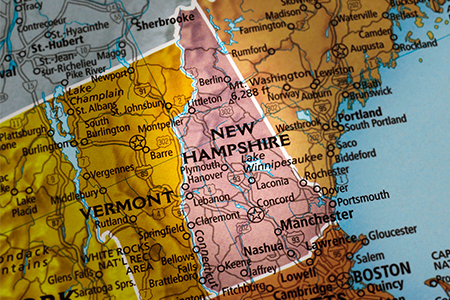You May Also Like
NEW HAMPSHIRE CPA EXAM & LICENSE REQUIREMENTS 2024
Keep reading to discover how to become a CPA in New Hampshire.

Every business needs a professional accountant to do its taxes, and individuals rely on accountants to help with small ventures, taxation, compliance and wealth management. The very top certification for the profession is the Certified Public Accountant (CPA) license awarded by each state independently of the others. Since each state has particular guidelines for its accountants, it is vital to study their rules prior to proceeding through an academic degree. Keep reading to discover how to become a CPA in New Hampshire.
Education Requirements for CPAs
New Hampshire’s guidelines follow the same basic structure of the other states. The New Hampshire Board of Accountancy requires that you complete their academic, examination and experience requirements. To fulfill the academic portion, you will need 150 semester hours including a bachelor’s degree. Then, you must pass the 4-part Certified Public Accountants examination and the Ethics exam. Finally, you will need one year of experience working as an accountant under the supervision of a licensed CPA.
The academic requirements for the New Hampshire Board are relatively straightforward compared to many states. You will need a minimum 120 hours to sit for your CPA exam which includes the following:
- Bachelor’s degree
- 12 hours in Accounting
- 12 hours in Business
To fulfill the Board requirements for full licensure, you will need 150 hours, including the following:
- Bachelor’s degree
30 hours in Accounting including:
- Auditing
- Financial Accounting
- Cost Accounting
- Taxation
24 hours in business-related subjects, including, but not limited to:
- Business Law
- Management
- Marketing
- Business Communications
- Business Ethics
Once you have earned your bachelor’s degree, you should consider enrolling in a master’s program that will help you fulfill the remaining credits you need for licensure. Employers these days increasingly look for advanced degrees, so you should go ahead and complete a master’s degree in accounting (MAcc), an MBA, or earn at least a certificate from an accredited graduate school of accounting.
Agencies Who Evaluate Your Work
Your credits must all come from a regionally accredited agency acknowledged by the U.S. Department of Education. You can discuss this issue with your college advisor if you are concerned. If your schools were not accredited, your work must be evaluated by the board or the National Association of State Boards of Accountancy (NASBA). If you studied abroad for some or all of your credits, your work must be evaluated by one of the following agencies:
- NASBA International Evaluation Services
- Educational Credential Evaluators (ECE)
- Educational Records Evaluation Services (ERES)
- Josef Silny and Associates
- Educational Perspectives
- International Education Research Foundation (IERF)
- Foreign Academic Credentials Service (FACS)
If you have credits from the College Level Examination Program (CLEP), online college or other non-traditional institutions, those are accepted by the board, provided that the credits transfer to a traditional 4-year institution.
Once you meet the minimum standards for sitting the CPA exam you need to have official, sealed transcripts sent from all of the educational institutions you have attended. Even if you took a single course from an online college and the credits transferred to your alma mater, the Board will need official documentation from that school. You will send your application materials to the NASBA office at this address:
CPA Examination Services
New Hampshire Coordinator
P.O. Box 198469
Nashville, TN 37219-8469
Once you have been approved to sit for the exam, NASBA will send you a Notice to Schedule (NTS). You will have up to six months to schedule your first exam with a New Hampshire Prometric site. There are two Prometric testing sites in the state, one in Portsmouth and the other in Concord.
The CPA Exam
The test itself is very difficult. In fact, many do not pass all parts on the first attempt, so work hard and try to be as prepared as possible. You may elect to take a CPA Review course and you can receive credit if the course is offered by an accredited institution. Commercial courses are not acknowledged and you cannot count them towards your academic requirements.
Each of the four parts of the Uniform CPA Examination must be passed with a minimum score of 75. The general breakdown of the exam consists of the following:
- Financial Accounting and Reporting–This part covers financial reporting frameworks from several industry experts. Candidates are asked to compare statements that reflect different reporting standards.
- Auditing and Attestation–This part tests your knowledge of the International Standards of Auditing as well as U.S. standards.
- Regulation–Your professional and legal responsibilities are covered in this section.
- Business Environment and Concepts–This portion covers general business concepts and international business and written communication skills are vital to passing this part.
Ethics Exam
Once you have passed each of the test portions, you can order the self-study Ethics course through the American Institute of Certified Public Accountants (AICPA). The course is 11 hours long and comes on a CD-ROM that includes all of the materials you need to take and pass the open-book exam. Though the test is not considered to be very difficult, you will need to pass with a score of 90.
Gaining Experience
New Hampshire then requires that you work under the supervision of a licensed CPA. Your work should demonstrate competency in a combination of any of the following:
- Auditing financial statements
- Financial advisory
- Audit processes
- Management advisory
- Tax return preparation
- Taxation advisory
- Consultation services
Your supervisor will be asked to attest to your skills in a formal letter to the board. You must provide your employer with the requisite forms which must be sent to:
NASBA Licensing Services
P.O. Box 198589
Nashville, TN 37219
For more information on becoming a CPA in New Hampshire, please visit the website of the Board: New Hampshire Board of Accountancy.